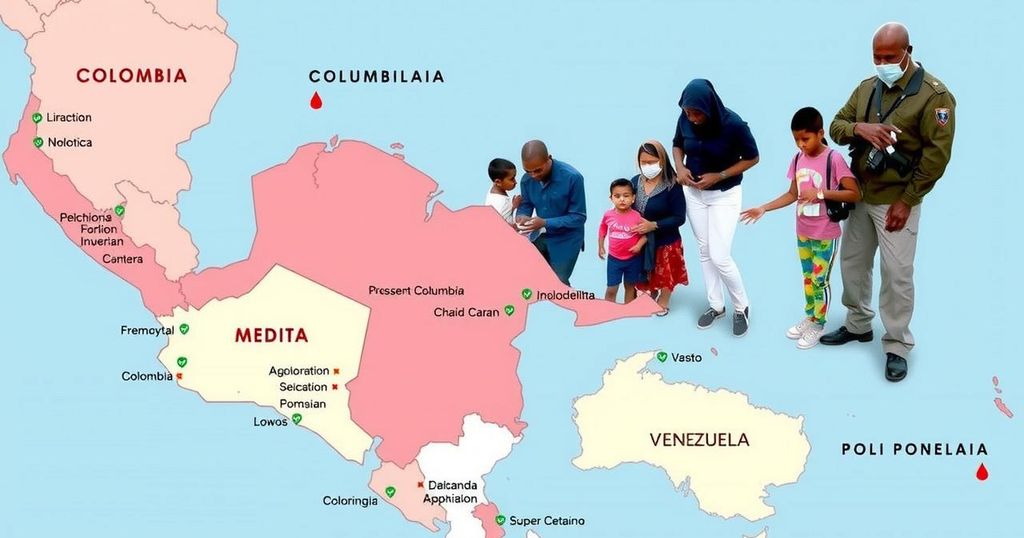The influx of Iranian nationals into Colombia with suspected false documents raises security fears among Latin American officials regarding Iran’s influence. This occurs alongside Venezuelan President Maduro’s celebration of deepening ties with Iran amid international scrutiny and allegations of electoral fraud. The cooperation includes military, economic, and training initiatives, with Hezbollah’s involvement compounding regional security concerns.
In recent weeks, there has been a notable increase in Iranian nationals entering Colombia with suspected false passports connected to Venezuela, raising significant security concerns among Latin American authorities and Western representatives. This surge coincides with Venezuelan President Nicolás Maduro’s controversial re-election celebrations, where he notably praised Iran during his speech, emphasizing the growing relationship between the two nations amidst international scrutiny.
Iran’s Foreign Ministry Spokesman, Esmail Baghaei, publicly backed Maduro, promising increased collaboration and solidarity against what he termed as “evil interventions and unilateral and illegal US sanctions,” further solidifying ties between Iran and allies like Russia, Cuba, and Nicaragua. The Maduro government, facing isolation due to alleged electoral fraud, appears to be strengthening its partnerships with Iran at a critical juncture.
The return of Alex Saab, a businessman connected to Maduro recently released from a US prison in a prisoner exchange, has accelerated collaboration between Venezuela and Iran. Saab, now Minister of Industry, is vital in consolidating economic and strategic relations.
Colombian migration officials reported that Iranian citizens are attempting to transit through Colombia using counterfeit documentation, likely aiming to benefit from its extensive air connections. High-quality forgeries have raised alarms about potential state involvement in this operation, fueling concerns over a coordinated migration strategy.
Moreover, reports indicate an advanced military-technical alliance between Venezuela and Iran, including a drone development program at the El Libertador airbase. Concerns also extend to the presence of Hezbollah in Venezuela, with support networks operating through familial structures integrated within the Maduro regime’s illicit economy.
Additionally, intelligence sources have indicated that Venezuelan nationals are receiving training domestically before moving on for specialized instruction in Iran. There is also an economic angle, with Mahan Air, sanctioned by the US and EU, facilitating exchanges between the two nations, including a gold-for-oil trade.
In summary, the relationship between Venezuela and Iran, characterized by mutual support and economic cooperation, poses significant challenges to regional security amid the rising influence of rival powers, notably Russia and China. This evolving dynamic calls for vigilant monitoring by international observers and policymakers.
The recent influx of Iranian nationals to Colombia, particularly during a time of celebration for Venezuelan President Nicolás Maduro, indicates a deepening relationship between Iran and Venezuela. This development occurred against a backdrop of alleged electoral fraud in Venezuela and its subsequent isolation from much of the global community. Such alliances raise concerns about the shifting geopolitical landscape in Latin America, particularly with respect to security and economic stability.
In conclusion, the growing ties between Iran and Venezuela, marked by Iranian nationals entering Colombia and significant bilateral agreements, suggest a robust, strategic partnership that presents challenges to regional security. Authorities are increasingly wary of potential threats stemming from this collaboration, notably the establishment of Hezbollah support networks in Venezuela. Consequently, continued observation and assessment by Western and regional powers are imperative to maintain stability in Latin America amidst shifting allegiances.
Original Source: www.intellinews.com






